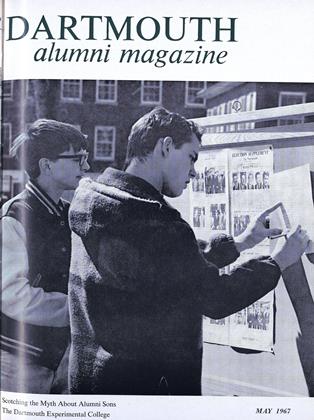By Prof. Robin Scroggs(Religion). Philadelphia: Fortress Press,1967. 139 pp. $4.25.
As indicated by its sub-title, "A Study in Pauline Anthropology," Professor Scroggs emphasizes St. Paul's understanding of man, particularly the "new humanity" which comes to view in Christ. Who is man? What is he destined to become?
Christian theologians have often answered such questions in terms of the past — in terms of the "first Adam" or in terms of the history of the race. From this perspective they have often dwelt upon and emphasized the sinfulness of man. Paul, himself, has frequently been regarded as this sort of pessimist. While Professor Scroggs by no means ignores the Pauline doctrine of the universality of sin, he demonstrates that the Apostle's view of man is primarily Christ-centered and "eschatological." That is, he looks not so much to the past as to the future, for the creativity of God is still working towards the culmination of all things in a "true humanity." This "true humanity" is not, however, simply a prediction of or speculation about the future. It is already present in Christ, the last Adam, and furthermore it becomes a reality in the life and experience of those who by faith are "in Christ." Christ is both the revelation of what we are to become, and the agent of our fulfillment. In this light man is glorified and glorious, the very pinnacle of creation.
Space permits only a bare listing of a couple of additional points, selected from many, of special interest. The "exalted Christ," the resurrected and heavenly man, is not, for Paul, something other than man. What he is, we are to become, but this does not mean leaving our humanity behind and entering into some sort of rarefied, purely "spiritual" existence that is "better" than human. Rather, the exalted Christ is perfected man, the last Adam. Professor Scroggs shows that we do not need to search for Paul's inspiration in some non-Jewish source (gnosticism, or some sort of oriental mystery cult). He is informed by his Jewish heritage, freshly viewed under the impact of Christ.
In terms of scholarship this is a most impressive book. The argument is clear and persuasive. It is backed not only by constant and critical reference to the relevant texts, but by a judicious weighing of the views of a great host of earlier scholars. Most impressive to this reviewer is the evident mastery of the Jewish sources, both the Hebrew scriptures and the Talmudic and non-canonical literatures. When one considers the enormous scope and volume of this material, one senses the measure of the patience and dedication which went into this study. Few non-Jewish scholars have had both the competence and the grit to undertake such a task. But after all, Paul was a Jew, "a Pharisee of the Pharisees." Professor Scroggs as taken this seriously and has produced a study which will surely make a great contribution future Pauline scholarship.
Professor of Religion
 View Full Issue
View Full Issue
More From This Issue
-
 Feature
FeatureScotching the Myth About Alumni Sons
May 1967 By RAYMOND SOBEL, M.D. -
 Feature
FeatureThe Humanistic Pursuit of Values
May 1967 By ROBIN J. SCROGGS -
 Feature
FeatureThe Dartmouth Experimental College
May 1967 By ROBERT B. REICH '68 -
 Feature
FeatureRefugees' Friend
May 1967 -
 Feature
FeatureManhattan Realtor
May 1967 -
 Feature
FeatureBotanic Director
May 1967
FRED BERTHOLD JR. '45
-
 Books
BooksCATHOLICISM AND AMERICAN FREEDOM
June 1952 By FRED BERTHOLD JR. '45 -
 Books
BooksTHE PHENOMENOLOGY OF MORAL EXPERIENCE.
July 1955 By FRED BERTHOLD JR. '45 -
 Books
BooksCHRISTIAN FAITH IN BLACK AND WHITE: A PRIMER IN THEOLOGY FROM THE BLACK PERSPECTIVE.
May 1974 By FRED BERTHOLD JR. '45 -
 Article
ArticleEndowed Professorships
FEBRUARY 1973 By FRED BERTHOLD JR. '45, R.B.G.
Books
-
 Books
BooksPUBLICATIONS
May 1925 -
 Books
BooksTHE ASTONISHED MUSE.
July 1958 By BINK NOLL -
 Books
BooksPIRATES PURCHASE
JANUARY 1932 By E. P. K. -
 Books
BooksTHE SIX LOVES OF "SHAKE-SPEARE."
OCTOBER 1958 By HERBERT F. WEST '22 -
 Books
BooksTHE GOVERNOR AND THE REBEL.
June 1958 By WAYNE E. STEVENS -
 Books
BooksTELEVISION AND RADIO IN AMERICAN LIFE.
July 1953 By WILLIAM R. LANSBERG '38

